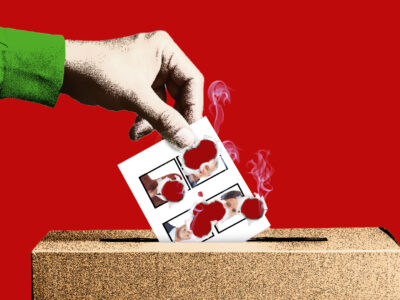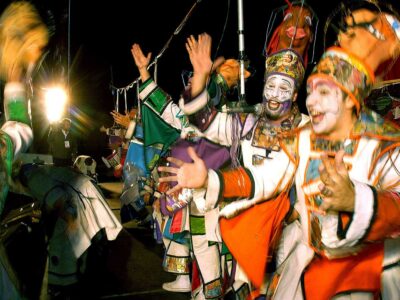Miguel Centellas de Pronto* provee un recuento del Referendum del 4 de mayo a llevarse a cabo en Santa Cruz, Bolivia.
- Español
- हिन्दी
- Ελληνικά
- Italiano
- Malagasy
- русский
- українська
- Română
- عربي
- Esperanto
- 日本語
- Português
- srpski
- Nederlands
- English
- Français
- বাংলা
- Deutsch
- Filipino
- 繁體中文
- Aymara
- македонски
- bahasa Indonesia
- Shqip
- नेपाली
- ᱥᱟᱱᱛᱟᱲᱤ
- Magyar
- polski
- اردو
- Dansk
- ଓଡ଼ିଆ
- Igbo
- Yorùbá
- Swahili
- ਪੰਜਾਬੀ
- čeština
- فارسی
- Қазақша
- Türkçe
- 한국어
- Български
- Svenska
- Ўзбекча
- Català
- 简体中文
- አማርኛ
- كوردی
- မြန်မာ
- پښتو
- ⲛογπίⲛ
- עברית
- Tetun
- ភាសាខ្មែរ
¿Ves todos los idiomas que hay? Traducimos las historias de Global Voices para que los medios ciudadanos del mundo estén disponibles para todos.
Lee más sobre Traducciones Lingua »






1 comentario
Autonomous on May 4, 2008
May 4th is posed to be an important day in history for all of Bolivia.
It is the day the States (Departamentos) of: Santa Cruz, Tarija, Beni, Pando, Cochabamba, and possibly Chuquisaca are leading a critical revolutionary movement in opposition to the central government of Bolivia, to transform their departments into autonomic political states moving towards a “federal country system”, similar to that of: Brazil, USA, Great Brittan, and Argentina. Most people don’t seem to know that Bolivia has a “Centralized government”, or exactly what that means.
Bolivia’s centralized government (located in La Paz) has complete control over: police, taxation and other government functions, the political authority extends over the entire economy. There are no state congresses, Legislature, or law making bodies. There are many problems with current political system.
Taxation: The current tax law “Lavantamiento del once Porciento” says only 11% of the income produced by ones state actually makes it back to own department. Money that is used for: Roads, Schools, and Police etc. The other 89% goes to La Paz, and stays there, helping with city projects, government building etc, those funds and government support rarely making it to other states.
This ratio in unfair for all states, but cuts deeper for those in Eastern Bolivia, which produces 65% of the country’s Gross Domestic Product, and Santa Cruz alone produces over 30% of the national GDP.
State government: Due to the lack of traditional “State government”, each state is treated the same way, even though having their own separate issues. It is like a having the same taxes and projects in the diverse states like: California, Maine, Illinois, and Georgia. This “one size fits all” attitude does not work; Bolivia is not a homogenous country. The county differs in: People (Ethnical background), Culture, Education, Income, Language and Land, just to name a few. Bolivia’s land changes from: High Mountains, Alti-Plano, Grand Chaco, and Lowland forest in the Amazon Basin. There are many different industries: Agricultural (Soy, Sugarcane), Mining, Petroleum business, Factories, Technology Companies, all of which have different needs, that are better addressed by region.
Ethnicity: I would also like to note Bolivia is not just a “Comunidad Andina” (Andean Community) as Evo Morales states. Almost 2/3 of Bolivia is not even in the mountains, and does not belong to the Aymara/Quechua: Ethnical, Cultural, or Language group. Coca is also something tied to the Andean culture and is not, of any consequence to the Eastern States in which have no businesses with it.
The majority of “Cambas” (people from Eastern Bolivia) are “Mestizo” and mix of Spanish and Indigenous decent, not white. The culture of Eastern Bolivia has been built around the indigenous cultures of their land (the Guaranies, Moxeños, Chiquitanos, Guarayos, and Chiriguanos all peoples for the Amazon Basin). Many monuments dedicated to their “mixed heritage” have been built around the city of Santa Cruz, like that of: Grigota, and La Madre India. A large number of words like: Camba, Cuñapé, Taita, Cunumi, etc., have all been borrowed for these local people.
Further Problems: The draft constitution put forth by the Central government in Late 2007, threatens the Businesses, Jobs and land-holding citizens of Santa Cruz. The fact is the constitution was not even reached legally. Evo got it approved, without the presence of opposition representatives, because they were not able to enter the hearings. Mr. Morales knew there were many Bolivians opposing his “new” constitution, and was unable to reach the 2/3 votes needed approve the bill.
Land Reform: There has been a strong reaction since land reform laws came in to affect, because it does not just concern the elites, but all Bolivians. According to the new bill, land owners who are not using their land productively will have their land redistributed to the, Indigenous Aymara and Quechua people of the Western Mountains. This law was targeted to gain rights to the fertile lands of the Eastern Bolivia. It is the middle to lower class people who are loosing the land reform battle. They are the ones who own land but don’t currently have the means to work the land, so they are forced to sell their land, because otherwise it could be possessed by the government, and given away without compensation. In affect these people are stripped of their rights, and robbed of land that they paid for, or was past down to them.
President Evo Morales and MAS
President Evo Morales is the leader of the “MAS” party (Movement toward Socialism) and a “Cocalero” (leader of the coca growers union). Mr. Morales is also friends with (Left-Wing) Leaders: Hugo Chaves (Venezuela), Rafael Correa (Ecuador), Fidel Castro (Cuba), and Mahmoud Ahmadinejad (Iran), all of which have anti-US sentiments.
Why Autonomy?
In short the Autonomists want a true democracy, for too long they have felt over looked and want a say in their own future. They want the chance for every region to manage its own: collection of taxes, form own internal laws and have more control over production of their resources. They would have a chance to, elect a state governor and have elected assembly with the powers to vote on state issues. With this state government they will be able to write its own polices on: taxes, telecommunications, housing and land.
Santa Cruz would have the opportunity to form and run its own police force.
They do not want to secede from Bolivia, they intend keep some level of coordination with the national government.
Current changes
Police: Santa Cruz has already taken steps to create its own police force, the current police force under the Bolivian government is under funded, undermanned, and the wages made by officers are low, resulting in an ineffective force that can be paid off.
Recently, the state government in the department of Santa Cruz have put their foot down and decided to keep more funds, to put towards paving roads, and other city works projects. Much of the mid to outer rings of Santa Cruz city, (and subsequently their neighborhoods) are still dirt roads. The process is slow due to low funding, but with more money to work with and a newly formed state government it will speed up the process.
Jobs: There has been a decline in available work for years in Santa Cruz as in most of Bolivia. Many families and youth alike are looking overseas (USA, Spain, Italy, Great Britain) for a better future, people who, if had other options would happily stay in the land that they love. Autonomy would change this; more money flowing in to their states will create more jobs, and new businesses again, jump starting the economy.
La Paz has also had a hold on any Government and Political jobs in Santa Cruz, breaking the power hold of “La Paz’s Central Government” will open new job and opportunities, previously lost to people from La Paz.
I have heard people use the word “Renegade” to describe the departments of Santa Cruz, Beni, Pando, Tarija, Cochabamba and Chuquisaca for waning to declaring their Autonomy, May 4th 2008. My question: Is it “Renegade” to want to stay democratic, to want to stop a socialist from driving up the price of goods? Is it “Renegade” to want to collect your own taxes from the revenue your state produces to go towards better: schools, roads, police forces, and over all quality of life.